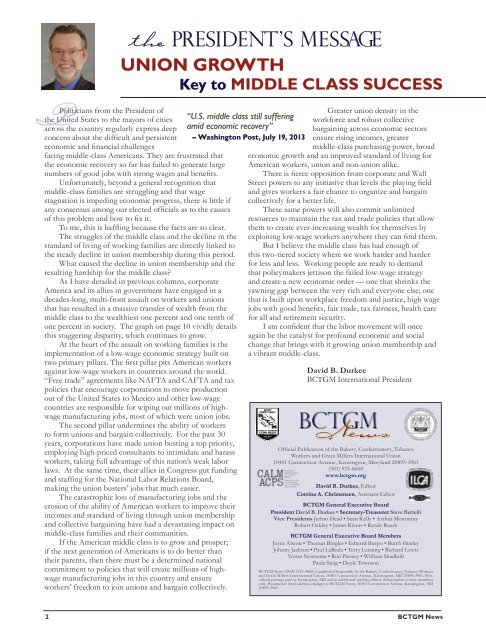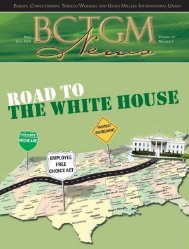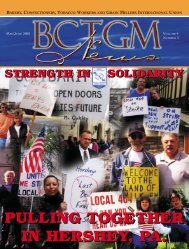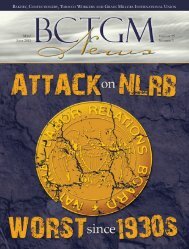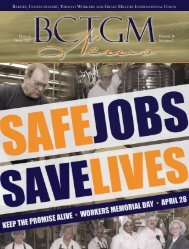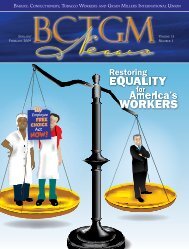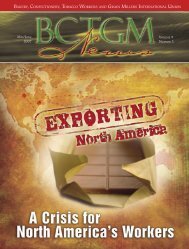You also want an ePaper? Increase the reach of your titles
YUMPU automatically turns print PDFs into web optimized ePapers that Google loves.
P<br />
the PRESIDENT’S MESSAGE<br />
UNION GROWTH<br />
Key <strong>to</strong> MIDDLE CLASS SUCCESS<br />
Pol<strong>it</strong>icians from the President of<br />
the Un<strong>it</strong>ed States <strong>to</strong> the mayors of c<strong>it</strong>ies<br />
across the country regularly express deep<br />
concern ab<strong>out</strong> the difficult and persistent<br />
economic and financial challenges<br />
facing middle-class Americans. They are frustrated that<br />
the economic recovery so far has failed <strong>to</strong> generate large<br />
numbers of good jobs w<strong>it</strong>h strong wages and benef<strong>it</strong>s.<br />
Unfortunately, beyond a general recogn<strong>it</strong>ion that<br />
middle-class families are struggling and that wage<br />
stagnation is impeding economic progress, there is l<strong>it</strong>tle if<br />
any consensus among our elected officials as <strong>to</strong> the causes<br />
of this problem and how <strong>to</strong> fix <strong>it</strong>.<br />
To me, this is baffling because the facts are so clear.<br />
The struggles of the middle class and the decline in the<br />
standard of living of working families are directly linked <strong>to</strong><br />
the steady decline in union membership during this period.<br />
What caused the decline in union membership and the<br />
resulting hardship for the middle class<br />
As I have detailed in previous columns, corporate<br />
America and <strong>it</strong>s allies in government have engaged in a<br />
decades-long, multi-front assault on workers and unions<br />
that has resulted in a massive transfer of wealth from the<br />
middle class <strong>to</strong> the wealthiest one percent and one tenth of<br />
one percent in society. The graph on page 10 vividly details<br />
this staggering dispar<strong>it</strong>y, which continues <strong>to</strong> grow.<br />
At the heart of the assault on working families is the<br />
implementation of a low-wage economic strategy built on<br />
two primary pillars. The first pillar p<strong>it</strong>s American workers<br />
against low-wage workers in countries around the world.<br />
“Free trade” agreements like NAFTA and CAFTA and tax<br />
policies that encourage corporations <strong>to</strong> move production<br />
<strong>out</strong> of the Un<strong>it</strong>ed States <strong>to</strong> Mexico and other low-wage<br />
countries are responsible for wiping <strong>out</strong> millions of highwage<br />
manufacturing jobs, most of which were union jobs.<br />
The second pillar undermines the abil<strong>it</strong>y of workers<br />
<strong>to</strong> form unions and bargain collectively. For the past 30<br />
years, corporations have made union busting a <strong>to</strong>p prior<strong>it</strong>y,<br />
employing high-priced consultants <strong>to</strong> intimidate and harass<br />
workers, taking full advantage of this nation’s weak labor<br />
laws. At the same time, their allies in Congress gut funding<br />
and staffing for the National Labor Relations Board,<br />
making the union busters’ jobs that much easier.<br />
The catastrophic loss of manufacturing jobs and the<br />
erosion of the abil<strong>it</strong>y of American workers <strong>to</strong> improve their<br />
incomes and standard of living through union membership<br />
and collective bargaining have had a devastating impact on<br />
middle-class families and their commun<strong>it</strong>ies.<br />
If the American middle class is <strong>to</strong> grow and prosper;<br />
if the next generation of Americans is <strong>to</strong> do better than<br />
their parents, then there must be a determined national<br />
comm<strong>it</strong>ment <strong>to</strong> policies that will create millions of highwage<br />
manufacturing jobs in this country and ensure<br />
workers’ freedom <strong>to</strong> join unions and bargain collectively.<br />
“U.S. middle class still suffering<br />
amid economic recovery”<br />
– Washing<strong>to</strong>n Post, July 19, 2013<br />
Greater union dens<strong>it</strong>y in the<br />
workforce and robust collective<br />
bargaining across economic sec<strong>to</strong>rs<br />
ensure rising incomes, greater<br />
middle-class purchasing power, broad<br />
economic growth and an improved standard of living for<br />
American workers, union and non-union alike.<br />
There is fierce oppos<strong>it</strong>ion from corporate and Wall<br />
Street powers <strong>to</strong> any in<strong>it</strong>iative that levels the playing field<br />
and gives workers a fair chance <strong>to</strong> organize and bargain<br />
collectively for a better life.<br />
These same powers will also comm<strong>it</strong> unlim<strong>it</strong>ed<br />
resources <strong>to</strong> maintain the tax and trade policies that allow<br />
them <strong>to</strong> create ever-increasing wealth for themselves by<br />
explo<strong>it</strong>ing low-wage workers anywhere they can find them.<br />
But I believe the middle class has had enough of<br />
this two-tiered society where we work harder and harder<br />
for less and less. Working people are ready <strong>to</strong> demand<br />
that policymakers jettison the failed low-wage strategy<br />
and create a new economic order — one that shrinks the<br />
yawning gap between the very rich and everyone else; one<br />
that is built upon workplace freedom and justice, high wage<br />
jobs w<strong>it</strong>h good benef<strong>it</strong>s, fair trade, tax fairness, health care<br />
for all and retirement secur<strong>it</strong>y.<br />
I am confident that the labor movement will once<br />
again be the catalyst for profound economic and social<br />
change that brings w<strong>it</strong>h <strong>it</strong> growing union membership and<br />
a vibrant middle-class.<br />
David B. Durkee<br />
<strong>BCTGM</strong> International President<br />
<strong>BCTGM</strong> News<br />
Official Publication of the Bakery, Confectionery, Tobacco<br />
Workers and Grain Millers International Union<br />
10401 Connecticut Avenue, Kensing<strong>to</strong>n, Maryland 20895-3961<br />
(301) 933-8600<br />
www.bctgm.org<br />
David B. Durkee, Edi<strong>to</strong>r<br />
Corrina A. Christensen, Assistant Edi<strong>to</strong>r<br />
<strong>BCTGM</strong> General Executive Board<br />
President David B. Durkee • Secretary-Treasurer Steve Bertelli<br />
Vice Presidents Jethro Head • Sean Kelly • Arthur Montminy<br />
Robert Oakley • James Rivers • Randy Roark<br />
<strong>BCTGM</strong> General Executive Board Members<br />
Joyce Als<strong>to</strong>n • Thomas Bingler • Edward Burpo • Butch Henley<br />
Johnny Jackson • Paul LaBuda • Terry Lansing • Richard Lewis<br />
Vester Newsome • Ron Piercey • William Shadbolt<br />
Paula Steig • Doyle Townson<br />
<strong>BCTGM</strong> News (ISSN 1525-4860) is published bi-monthly by the Bakery, Confectionery, Tobacco Workers<br />
and Grain Millers International Union, 10401 Connecticut Avenue, Kensing<strong>to</strong>n, MD 20895-3961. Periodicals<br />
postage paid at Kensing<strong>to</strong>n, MD and at add<strong>it</strong>ional mailing offices. Subscription <strong>to</strong> new members<br />
only. Postmaster: Send address changes <strong>to</strong> <strong>BCTGM</strong> News, 10401 Connecticut Avenue, Kensing<strong>to</strong>n, MD<br />
20895-3961.<br />
2 <strong>BCTGM</strong> News


